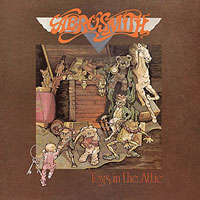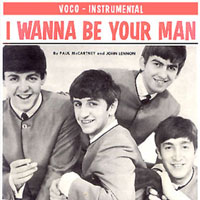
Be quiet for a moment. Listen. Can you hear that? The frenzied chattering has stopped. That intolerable flat hiss, I think I finally got rid of it! Perhaps this outcome is a little obvious in hindsight, but I definitely didn’t see it coming. I’ve spent the last two decades in full defense mode, every morning habitually standing rigid with my nose pressed against the mirror, aggressively debating the ranking order of Radiohead’s works, not only based on their brilliance, but also their influence on my existence. Occasionally, there were words which nearly turned to blows, believe me. I guess looking back, it does make some sense to connect these routine practices to some of my more... inconvenient disturbances. It's just that I’ve heard that rusted train of my mind grinding against those contemplation tracks over and over and over again, so many times that the wheels had permanently scarred the iron. The levee of Radiohead opinions had built up so much pressure from all angles of discussion that the eventual relief of venting the floodgates became an uncontrollable scene of gushing reflection, so eager to finally escape the cocooned prison of my skull after so many years of confinement. Not a single original thought was required in the composition of this article. These passages wrote themselves. These are not my words, I was merely the medium, and yet I will happily take the credit, thank you.
Please ignore that whole bit I said earlier on about those voices in my head hahaha I was only joking about that hahahaha obviously lol. But even despite whatever, it’s surprising that I only wrote this piece now, for reasons I hardly need to explain. Radiohead have been my on-again, off-again favourite-band-in-the-world love affair since the early 2000s, which means that I was actually embarrassingly late to the gathering. Regardless, I made up for lost time by pissing on everything and claiming it as mine so loudly that everyone simply assumed I’d always been here. Radiohead themselves, however, are why we’re having this conversation even if I’ve only really been talking about myself thus far.
Ok, so Radiohead then, already an undeniably fat chapter in the textbook of musical greats. I could easily copy and paste a dramatic swarm of extraordinary achievements from Wikipedia, using those numbers and polls to present a bulletproof case proving their already monumental legacy, but instead, I’d rather present my ballsack with this little declaration: Radiohead are one of the most important bands in history, and the only reason they don’t get their due acknowledgement in this regard, is because they are still going. Believe me when I look at you in the eyes, and I tell you with all the stress my lungs can muster, that in 50 years, they will still be an academic topic, and your grandchildren will be asking you if you ever saw them live (for the record, I have, three times). They are like The Beatles, in that they have enough mainstream appeal to conquer the charts with every release, and yet they also have the artsy smarts to push even the most seasoned of pompous stoners far out of their cosmos. They are also like The Beatles, because they have never released a bad album, they got better as they went along, and they somehow maintained a firm grasp on each member, not a single unit of the tight Radiohead crew ever leaving or being replaced, which includes their producer (since 1997) and go-to artwork designer (since 1995). Basically, they are like The Beatles of our time, do you understand?? I’m not even the first to say this! I really wish I was though!
Shit, you’re still here? Was I doing the thing again? Sorry, I didn't realise you were waiting for me. Let’s walk in this straight line then. Presenting the Worst to Best of Radiohead, the definitive order, no one else’s list is correct unless it goes exactly like this, no exceptions:

09. Pablo Honey (1993)
Alternative Britpop RockSpotify
Considering all of their inconceivable feats, one Radiohead achievement which was impressively unique stands as this one: their first album was their absolute worst. Usually, a band’s debut features years of hard work and live rehearsals before a record deal answers the phone, meaning that most bands' standard introduction is essentially a greatest hits compilation, artists traditionally only stumbling during the sophomore pressure. In Radiohead’s case, however, their launch came crushed beneath the “One Hit Wonder” sticker of doom, Creep almost embarrassingly regarded as their signature tune, somehow still to this very day. Yet as part of the whole package, this song and album were nothing more than self-loathing grunge copies, painfully 90s, so common, so conventional, absent of the artsyfarts they ultimately became known for. Be all of that as it may, however, hindsight has been warmer, and I value both sides of the tugging rope. Obviously, if we compare Pablo to what followed, it’s gum under their boots, unanimously agreed upon as their weakest endeavour, lacking everything that made them great in later years. But! If we praise it as the very first step of such a historic journey, it’s one fascinating listen, with occasional winks towards what was to come (Blow Out, hello??), and in the end, unfairly dismissed only because it was the easy thing to do.

08. The King of Limbs (2011)
Experimental Electronic RockSpotify
There is no Radiohead album more problematic to dissect than that of The King of Limbs. You end up contradicting yourself, writing in circles, scribbling out of the lines, and then forgetting where you were going with that. The band had evidently made the conscious decision to drive their creative power out into the fields of weird again, by dancing around glitchy rhythmic centers and looped samples, one studio-heavy twitch, while traditional instrumentation was almost dissolved in the light rainfall. And yet even these electronic jitters were surprisingly relaxed, lost deep within the thought of a very strange nature, spooky and ominous and... dull? Which was where the dilemma started. Everyone agreed that this was a good record, but it was lacking... something. Lacking ingenuity? Lacking a pivotal artistic development point? Lacking basically what every Radiohead album had excelled at before this? Lacking of limbs? Who are we to say? And yet, somehow, impossibly, it was these very downfalls which also blossomed as TKOL’s most notable strengths, as the record was abandoned by the circle of approval, and in turn, became the ugly beautiful reject, sat outside the cafeteria, forsaken by its peers, not included, uninvited. Because it was too short. Because certain songs were obviously much healthier than others. Because the exclusion of The Daily Mail is one of Radiohead’s greatest professional mistakes. Because, perhaps, we still just don’t get it.

07. Amnesiac (2001)
Experimental Electronic Art RockSpotify
Ignoring what Thom told you, Amnesiac is less of an album, more of a b-side collection of Kid A residual. Kid B. The reject twin. Recorded during the same sessions, severed at birth, the ugly scraps carved off of the prime meat, thrown aside to keep the host mother pristine, packaged separately and sold at cost price. Due to this gruesome spectacle, Amnesiac will forever wither beneath an infinite shadow, unfairly compared to the superior product, labelled as an inconsistent, flawed bag of mixed treats, one diverse mess of graceless jazz-fidgets, a stiff machine of mentally unstable restlessness. Cast your mind back to the asphyxiation of Kid A who was released a mere eight months earlier, and the comparisons turn even stranger. Remember how resistant the public outcry was against the first-born? And then remember how the grain of glorification expanded until Kid A was honoured as the most innovative album of the decade? Strange then how the apathetic confusion for Amnesiac still stands relatively fixed, fans remaining uncertain, half-heartedly debating its importance without too much interested in a satisfactory resolution—it's just not worth the effort. But hear me now: this album is the rarest of all the Radioheads. Say what you will about Kid A (and we do!), but this specific congregation is a far more carefree, band-y, song-y, and unpredictably mysterious offering than anything the aforementioned classic would even dare to be. Hence why this is unchallenged as the greatest b-side compilation ever created, so says me, amen.

06. The Bends (1995)
Alternative RockSpotify
For close to 10 years, Radiohead’s career was a path of obvious stepping stones, calculated progressions, moving forward in dramatic strides, yet unable to fully shake the scent of their previous environment. Armed with that thought (and overlooking the immensely conflicted public reaction between the two), The Bends is Pablo Honey. They were both standard 90s guitar rock affairs with the instantaneous superglue stick of Britpoppy ideology, except this time... they came bearing songs which were actually good. Great, even. A far more textured meal. Not a sliver of filler on offer. The band’s puberty record, and goodness gracious me, they were growing up so fast, featuring some of their most impressive compositional statements to date, purely because they hadn't cowered beneath the safety net of artiness just yet, instead presenting a simple collection of moods which either sunk deep into the abyss of depression, or shouted loud from waves of distorted aggression (a scarcely found demeanor on future recordings). Contemplate all of this with Godrich and Donwood now permanently on board, and the constellation had lined up forever, sketching the episode where our legendary tale truly begins. So... one of the most influential alternative albums ever made? Oh God, undeniably so! But ahead of its time? Not whatsoever. And, therefore, the tiniest bit overrated? What, are you asking me? Yes.
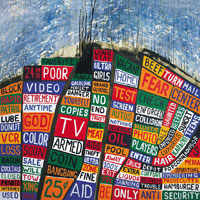
05. Hail to the Thief (2003)
Alternative Art RockSpotify
If we were to individually personify this catalogue’s components, Hail to the Thief would be the lunatic most likely to win in a brawl. Here is the ugliest of monsters, hiding within a dark forest you remember from a childhood bedtime story; bitter, anxious, confused, and ready to eat you. What a densely dangerous tale that is. The band's intention was to cook this concoction very quickly with all artistic pretensions turned up to the maximum and a political kick in their step. The meeting point was conveniently organised in the dead center of their musical map; the long-rejected guitar riffs were back and they were angry, balanced out by the palpitations from their most recent electronic adventures, complete with panicked uptempos and draggy sedation, the best of both Radiohead worlds now copulating, somehow birthing a baby completely different from either parent. Contradictory to the years preceding, this was not some sucker-punch of transformation, but rather a familiar murder, growing over your body like a moss, suffocating you until you were all gone. Initial critics were frustrated and have often left this album behind, foolishly regarding it as a lengthy, exhausting, and flawed project. Yet, in hindsight, Hail to the Thief is absolutely timeless, towering over the Radiohead land as their most underrated of treasures, sounding more relevant now than it ever did. Hail it, you ungrateful fucks! Hail it!
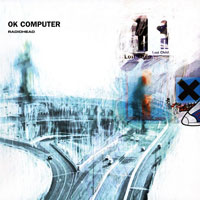
04. OK Computer (1997)
Alternative Art RockSpotify
Radiohead’s success was bleaking them out. The isolation was pushing their naked skin against a cold metal until they were hopelessly scared, and then they shattered outwards. This was a natural defense mechanism, an abstract progression which had begun to lose grip on the guitar work, the strings visibly evaporating into an atmospheric fog, controlled by machines plotting their conquest. During this crisis, OK Computer stabbed up through the ground, and the people fell to their knees, instantaneously worshipping it as a historical landmark, frozen in the most important league of all albums ever made. We were no longer dealing with an ordinary band anymore, that much was certain. Make no miscalculations: without this record, Radiohead would not be a conversation. This is still the album which all of their other albums lean upon, sprouting outwards in one way or another with their own dedicated followers, but everyone—art students, simpleton radio listeners, critical publications, award ceremonies, MTV execs, Library of Congress—everyone agreed that this was a significant contribution to the very fiber of music itself. And yet... for me... it felt like the aura of devotion had outgrown the nervous system, while the devotees themselves were so delirious by its fumes that you couldn't engage in a sober dialogue about their fucking holy artifact. Please, you must believe me, I get it. It's OK Computer. It's an insult to even call this an album. But when I listen to it, I hear the restless sound of a distracted band headed somewhere else. This is a mere stopover, where Radiohead filled up with gas, checked the map, and then continued on their quest towards the boundaries of themselves. Which, as we all know, was a territory they discovered shortly afterward...

03. A Moon Shaped Pool (2016)
Art Rock Chamber PopSpotify
In the evolution of Radiohead, each phase reads like a forceful push towards an epiphany, scrounging for elitist influences whilst utilising unprecedented promotional methods until we all receive yet another grandiose announcement that, of course, the band have gone and done everything differently once again. A Moon Shaped Pool was not that. The desperate sense of experimental urgency had been distracted, the yearning to prove themselves had been smothered out by creamy layers of orchestral ambiance and luscious glooms, inspired by nothing but their own introspections, finally breathing in that fresh cold oxygen that they had invented themselves. In this place, the group seemed their most comfortable, standing dignified on a level terrain, no song singing louder than another, a melodic mid-tempo heart rate keeping them live as they held hands with a ghostly figure, looking into each other's eyes, both defenseless yet never boring, sculpted to an icy perfection, melting within your freezing palm. And now here we are, the definitive proof that three decades worth of industry aging does not equate to becoming stale. No loss of talent can ever be blamed on time, because... Radiohead. Radiohead! Still the world’s most crucially valuable musical act, after wearing that title for a lifespan longer than any other group in history. Three decades! Nobody has been this important for that long.
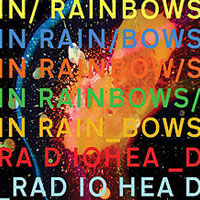
02. In Rainbows (2007)
Alternative Art RockSpotify
It’s impossible to avoid the sidetrack temptations, and we will always end up discussing In Rainbows as the benchmark album it was before anyone had even heard the damn thing. With this contribution, the band had become the first major act known to employ the pay-what-you-want model, an adventurous gamble which questioned the very value of music with deafening reactions fluctuating from all sides of fans and industry workers alike. But Radiohead were independent now! They did what they wanted! And surprisingly, what they wanted to do, was present a normal album for once, perhaps the least pretentious piece they’d accomplished since The Bends, except happier, more upbeat, and confidently assertive. In fact, the strangest aspect of this release was the aforementioned financial experiment, so what else do you even wanna know? Everything is in the name anyways. In Rainbows, eh. That colourful dream we had back in 2007, when Radiohead gently floated down from their artsy pedestal carrying a collection of rich, self-reliant songs, easy to digest with the rulebook still perfectly intact, alluring the listener with romantic gestures, inviting us to sit down in this naturally attractive landscape as they fed us their latest delicacies without wasting a single moment of our time. And it was in these thoughts, that the band’s seventh studio album became their most flawless gift yet, transcending the irrelevant business strategies, and standing as one of the very few perfect records I’ve ever heard in my life.

01. Kid A (2000)
Experimental Electronic Art RockSpotify
The OK Computer microscope had squeezed a mental breakdown out of Yorke’s brain, and that’s when Radiohead hit their peak disinterest. The straight-A students had grown bored of outsmarting their teachers, and with the blessing of a label who were still sopping wet from Radiohead money, our heroes climbed into their spaceship and set sail, determined to discover the confines of the Radiohead universe. And this is what they found: stretched minimal ambiences; skittish IDM drum patterns; freeform jazz ethics weaving gorgeously cold soundscapes together as a singular unit; disjointed one-liners and a pulsation of obscure electronics humming out into the atmosphere; structureless and abstract everything; the guitar is dead in space. Now lift up these cryptic complexities, and below you will note the rewarding reaction from critics, who (perplexed by the fruits that this otherworldly excursion had produced) hastily dismissed the result as “awful”, without exercising the necessary hesitation required to adequately bite through its texture, tasting that metallic winter which would dribble down their throats and choke their voices shut. These critics have since been banished, sealed in an embarrassing hole of ignorance forever, forced to repent, admitting now that Kid A was the prophecy we had all been promised. It crippled the imitators, it floated ahead of its time and ahead of time itself, and continues to expand to this very day. Look around you. It's nearly two decades on, and with a little bit of honesty, you'll confess this as still the most important album of the millennia according to criteria which extends beyond your own opinion. And while we're still talking, this is a high competitor for the greatest album ever made as well. And now we're not talking.
Follow @LegoTrip
















